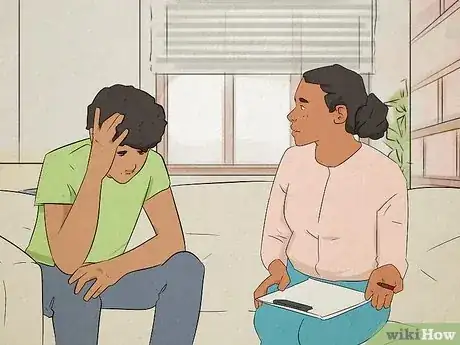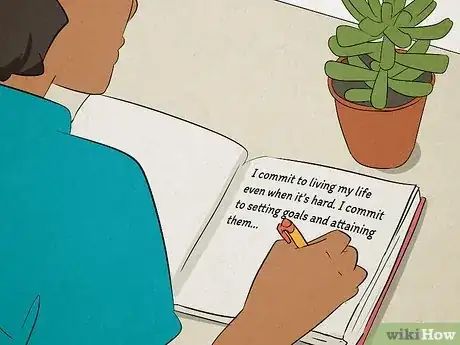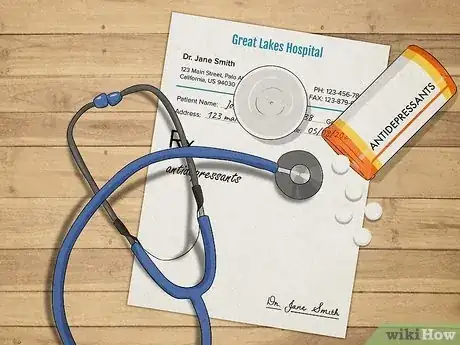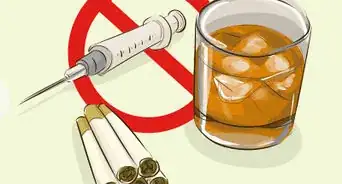This article was co-authored by Trudi Griffin, LPC, MS. Trudi Griffin is a Licensed Professional Counselor in Wisconsin specializing in Addictions and Mental Health. She provides therapy to people who struggle with addictions, mental health, and trauma in community health settings and private practice. She received her MS in Clinical Mental Health Counseling from Marquette University in 2011.
There are 12 references cited in this article, which can be found at the bottom of the page.
This article has been viewed 90,639 times.
Thoughts of suicide can be very scary and difficult to cope with. Feeling suicidal can include: feeling extremely hopeless or depressed, thinking that you want to harm yourself, thinking about ways to harm or kill yourself, and making a plan to harm yourself.[1] Coping on days when you feel suicidal can be accomplished by keeping yourself safe, committing to life, getting social support and receiving psychological treatment.
- If you are currently having serious thoughts of harming yourself or have a plan to harm yourself or take your life, you need to get help right now.
- If you are in the U.S. you can call 911 or call or text the Suicide and Crisis Lifeline at 988.
- You can find international listings for suicide hotlines at http://www.suicide.org/international-suicide-hotlines.html.
Steps
Keeping Yourself Safe
-
1Get somewhere safe. Keeping yourself safe on days when you feel suicidal is about knowing what to do when you have suicidal thoughts. Being in a safe place can help reduce the risk of acting on suicidal thoughts.[2]
- Identify places you can go, such as a friend’s, family member’s home, or your therapist's office.
- You can use these helpful safety plan cards to remind yourself where to go.[3]
- If you can’t get somewhere safe, call your local emergency number (911) or a suicide hotline.
-
2Remove harmful items. Your ease of access to potentially harmful items can make it more difficult to resist self-harm behaviors.
- Remove blades or weapons from your or the home immediately.[4]
- Remove medications if you might use them to harm yourself.
Advertisement -
3Go to someone for help. Feeling disconnected or alone can lead to suicidal thinking.[5] Increasing your sense of connection may help to reduce thoughts and actions related to suicide.[6]
- First identify people or agencies you can call including: specific family members, friends, healthcare professionals (doctor or therapist), emergency numbers (911) and suicide hotlines. Then go down the list and start calling each person or agency. Try your close family members friends, or therapist first (if you are currently safe and not planning on harming yourself).
- Identify how others can help you, such as: taking you to the hospital, talking with you about your feelings, comforting you, distracting you, and cheering you up.
- Social support may be one of the biggest factors that reduce suicidal thoughts and actions.[7] So anything you can (that is safe) to get support from your loved ones during this time. Talk to a friend, spend time with your family, be around people who support and love you.
- If it feels like you don't have anyone to support you right now, call your therapist or a service such as the Suicide and Crisis Lifeline (988). These people have been trained in supporting people who feel vulnerable and can help.
- It's often the case that LGBTQ people, especially LGBTQ youth, lack a strong social support system. If you're an LGBTQ youth and don't feel like you have anyone to turn to, call the Trevor Project at 1-866-488-7386, or go online to chat with a professional.[8]
-
4Reduce triggers. Warning signs, or triggers, can be thoughts, feelings, behaviors, or situations that make you feel out of control or lead to thoughts of suicide. Understanding what your triggers are is an important step in preventing suicidal thoughts, and learning to cope if you have them.[9]
- Stress is a common predictor of suicidal thoughts.[10] Ask yourself if you have suicidal thoughts when you are very stressed or overwhelmed with your current situation.
- Identify situations that may increase your thoughts of suicide and avoid these. Some examples might be: arguments or issues with family members, staying home alone, stress, depressed mood, relationship issues, work or school issues, and financial concerns. Avoid any of these triggers if you can.
-
5Use coping skills that work for you. Part of keeping yourself out of harm is using appropriate coping skills when you do have thoughts of harming yourself. Think about what has helped in the past and identify the best ways to cope.
- Identify ways to make yourself calm and soothe yourself. Some ideas might include: exercise, talking to a friend, journaling, distraction, relaxation techniques, deep-breathing, meditation, and mindfulness. Then use those skills!
- Religious and spiritual coping skills (prayer, meditation, attending services, religious traditions) have been shown to be a large protective factor against suicide.[11]
- Do not use alcohol or other substances to cope. Using substances can increase your risk of suicidal thoughts and tendencies.[12]
-
6Talk positively to yourself. Self-talk is a crucial component of coping with thoughts of suicide. You have the power to change your mood through your thoughts.[13] Identify some things you can say to yourself (especially reasons to stay alive) right now and when you have thoughts of self-harm in the future.
- What would you say to a friend that was feeling this way? You might say something soothing such as, “I know this is so hard for you right now, but things will get better; you aren’t always going to feel or think this way. It will pass. I will be here for you in the meantime. I love you and I want you to live and be happy.”
- Some examples of positive self-talk you can use include, “I have many reasons to live. I want to be there for my family and friends. I have plans for the future and things to accomplish that I haven’t yet.”
- Thinking that suicide is immoral or wrong is a protective factor against suicide, but it can also make you feel guilty for thinking about it. [14] If you believe that suicide is morally wrong, remind yourself of this value you hold, but tell yourself that you're not a bad person for feeling suicidal. You could think or say to yourself, "I know I have moral beliefs against suicide, but it's not my fault I feel like killing myself. I will give myself a break and learn to cope with my thoughts and feelings in ways that don't cause me harm."
- The belief that you have social support is also a protective factor against suicidal thoughts and actions.[15] Remind yourself that you are loved and cared about. You could say to yourself, "I am loved. My family loves me. My friends love me. Even if I think or feel that they don't right now; I know deep inside that they do. They do not want to see any harm come to me and they would be very upset if I was harmed."
Making a Commitment to Life
-
1Commit to reducing suicidality. Despite your negative thoughts and feelings, it is crucial to commit to reducing your thoughts of suicide and any self-harm behaviors.[16] If you are fully committed to staying alive, this goal can help you cope in times of stress.
- Making a commitment to reducing suicidal thoughts may include agreeing to: use positive self-talk, identify goals and stick to them, remind yourself of the positive, and identify other ways of coping with negative thoughts and moods.
- You can write down your commitments to life. You may write something like, “I commit to living my life even when it’s hard. I commit to setting goals and attaining them. I commit to using coping skills and getting help if I have thoughts of harming myself.”
-
2Identify goals and stick to them. Having goals in life is one way to have a commitment and purpose, which can safeguard against thoughts of suicide. Goals give you something to live for, and you can remind yourself of these goals whenever you have thoughts of harming yourself.
- Some examples of life goals are: a career, getting married, having children, and traveling the world.
- Remind yourself of the goals you have for the future. It would be a shame if you missed out on the amazing parts of life.
-
3Identify the positive aspects of your life. Another way to commit to life and cope with thoughts of suicide is to acknowledge the good things about your life.[17] This can alter your suicidal thoughts and move them toward why you want to remain alive.
- Make a list of everything that you appreciate in your life. This list could include things like: family, friends, Italian food, traveling, being in nature, connecting with others, playing the guitar, and music. These are the very things that may bring you solace when you have thoughts of suicide.
- What do you enjoy doing? What gives you the most satisfaction? Do you like to cook or to help your friends or to play with your dog? If you were not pressured by your circumstances, what would you be doing the whole day? Think carefully about it and spend more time doing these things.
Relying on Outside Support
-
1Get psychological treatment. If you have recurrent thoughts of harming yourself, you need to receive therapy or other psychological treatment. Therapists are typically trained to deal with suicidal thoughts, and can serve as a crucial support to you.
- If you do not currently have a therapist, contact your health insurance provider for a list of approved clinicians or conduct a local search for low-cost, sliding scale, or free mental health clinics.
-
2Maintain or develop a healthy support system. Social support is crucial to coping with suicidal thoughts.[18] This is because not having social support can result in depression and increased thoughts of suicide.[19] If you have family or other loved ones you can turn to, do so. If you don't feel like you have anyone, your therapist can be that support system while she helps you build a support network for yourself.
- Talk about your thoughts to whoever you find comfortable talking about it with. If you don't feel like you have anyone, call your therapist or a service such as the Suicide and Crisis Lifeline (988).
- Tell others about your safety plan so they can be involved and ready to help you if you need assistance.[20]
- Healthy relationships should not include being repeatedly insulted, berated, picked on, or injured. If you have a relationship that is abusive, get help now.
- A healthy support system includes a variety of people you can turn to for support and help, including friends, family, teachers, counselors, doctors, mental health professionals, and hotlines.
-
3Consider medication. Medication, especially antidepressants, can be used to treat the depressive symptoms that often coincide with thoughts of suicide. However, be aware that taking some antidepressants and other medications may actually increase your risk of suicidal thoughts and actions. Always discuss side effects and risks with your doctor before taking any medication, prescribed or otherwise.
- Ask your mental health professional about antidepressants, or other medications to treat suicidal thoughts and behaviors.
- If you do not have a doctor or psychiatrist, contact your health insurance provider or go to a low-cost health clinic in your area.
Warnings
- If you are currently having serious thoughts of suicide or have a plan to harm yourself, please call a suicide support line such as the Suicide and Crisis Lifeline (988), your local emergency number (911), text-based support lines like Crisis Chat, or go to your local emergency room.⧼thumbs_response⧽
References
- ↑ http://epirev.oxfordjournals.org/content/30/1/133.long
- ↑ http://www.getselfhelp.co.uk/docs/SafetyPlan.pdf
- ↑ http://www.getselfhelp.co.uk/docs/SafetyPlanCards.pdf
- ↑ http://jama.jamanetwork.com/article.aspx?articleid=201761
- ↑ http://bjp.rcpsych.org/content/201/6/466.short
- ↑ http://epirev.oxfordjournals.org/content/30/1/133.long
- ↑ http://bjp.rcpsych.org/content/185/5/385.long
- ↑ https://www.thetrevorproject.org/
- ↑ http://www.getselfhelp.co.uk/docs/CrisisManagementPlan.pdf
- ↑ http://bjp.rcpsych.org/content/201/6/466.short
- ↑ http://epirev.oxfordjournals.org/content/30/1/133.long
- ↑ http://www.ncbi.nlm.nih.gov/pmc/articles/PMC3066301/
- ↑ http://www.ncbi.nlm.nih.gov/pmc/articles/PMC3073681/
- ↑ http://epirev.oxfordjournals.org/content/30/1/133.long
- ↑ http://epirev.oxfordjournals.org/content/30/1/133.long
- ↑ http://www.getselfhelp.co.uk/docs/CommitmentLife.pdf
- ↑ http://www.ncbi.nlm.nih.gov/pmc/articles/PMC3073681/
- ↑ www.ncbi.nlm.nih.gov/pmc/articles/PMC3066301/
- ↑ http://bjp.rcpsych.org/content/201/6/466.short
- ↑ http://bjp.rcpsych.org/content/201/6/466.short











































































